Russell Moore
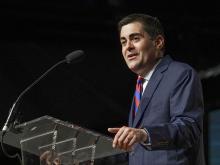
Southern Baptists are usually the first to defend religious freedom. But when it comes to Muslims, some want to draw a line.
At their annual meeting in St. Louis, an Arkansas pastor said Baptists shouldn’t support the right of Muslims to build mosques, especially “when these people threaten our very way of existence as Christians and Americans.”
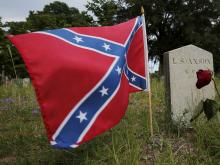
The Southern Baptist Convention, born in 1845 in a split over its support for slavery, passed a resolution calling for Christians to quit using the Confederate flag.
“We call our brothers and sisters in Christ to discontinue the display of the Confederate battle flag as a sign of solidarity of the whole Body of Christ, including our African-American brothers and sisters,” reads the resolution adopted Tuesday at the convention’s annual meeting in St. Louis.

Religious freedom is a foundational tenet for Southern Baptists, but apparently one church official in Georgia didn’t get the memo, at least as it applies to Islam.
Now Gerald Harris is facing sharp criticism, but also the prospect of a Ramadan meal with local Muslims who have invited him so he can get to know them better.
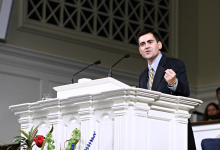
Southern Baptist leader Russell Moore has not been shy about mixing it up with Donald Trump, and now Moore is at it again, telling an interviewer that the presumptive Republican presidential nominee is a “lost person” who needs to find Jesus.
“My primary prayer for Donald Trump is that he would first of all repent of sin and come to faith in Jesus Christ,” Moore told David Brody of the Christian Broadcasting Network in a video posted June 3.

Russell Moore wrote an article May 13 about the Obama administration’s move to protect trans students in public schools across the country. While I disagree with Moore on many topics, I respect him as a compassionate leader and I’ve appreciated the ways he’s challenged the Southern Baptist Convention to seek justice for many who have been marginalized. This article was uncharacteristically culture war-y and fear-based, though. It contributes to the narratives that lead to the kind of bullying and discrimination that the Obama administration is seeking to end.Russell Moore wrote an article May 13 about the Obama administration’s move to protect trans students in public schools across the country. While I disagree with Moore on many topics, I respect him as a compassionate leader and I’ve appreciated the ways he’s challenged the Southern Baptist Convention to seek justice for many who have been marginalized. This article was uncharacteristically culture war-y and fear-based, though. It contributes to the narratives that lead to the kind of bullying and discrimination that the Obama administration is seeking to end.

As you likely know, faith-based organizations don’t endorse candidates. So you won’t be surprised that I am not going to endorse Donald Trump — neither will I endorse his Democratic opponents, Hillary Clinton or Bernie Sanders. But we faith leaders will comment on the morality of this presidential campaign, the issues raised or not raised, and the morality of candidates based on our moral values. That’s what we “values voters” do. And we will again this election year.
Of course, Trump took notice and attacked, in one of his regularly ugly tweets, calling Dr. Russell Moore a “truly a terrible representative of Evangelicals and all of the good they stand for. A nasty guy with no heart!"
Well, Donald, many of us are right with Russell on this, and you will face strong opposition to your political use of racial bigotry from Christians across the political spectrum. If you had the courage to join a public forum with us faith leaders on the terrible dangers of racial bigotry in a time of such division and fear, it could be very good for the country.
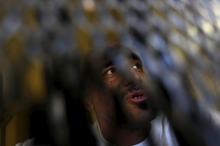
Pope Francis continues his drumbeat for a global moratorium on the death penalty. This is a wake-up call not just for Catholics, but also for all Christian leaders and lawmakers to reflect and take action.The words of the world’s most popular faith leader in fact come at a time when religious communities are questioning the death penalty theologically and biblically. Opposition to the death penalty even among conservative Christians continues to mount, as evident in the National Association of Evangelicals’ thoughtful reconsideration of its strong support of the death penalty.

Russell Moore may be president of the Ethics & Religious Liberty Commission of the Southern Baptist Convention. But don’t call him an evangelical — at least not until the current election cycle ends.
Moore started introducing himself as a “gospel Christian” a few weeks ago. That’s because, he said, “The word ‘evangelical’ has become almost meaningless this year, and in many ways the word itself is at the moment subverting the gospel of Jesus Christ.”

Just weeks before the Iowa caucus, GOP presidential contender Donald Trump is aiming his proudly “politically incorrect” anger and his pledge to be “great!” directly at evangelical Christians. “I’m going to protect Christians,” who are losing their power in American society, he said Jan. 18, addressing 100,000 Liberty University students — packed in the Lynchburg, Va., campus sports arena or viewing online.
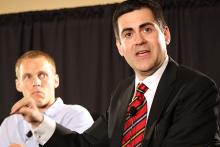
Russell Moore, president of the Ethics and Religious Liberty Commission of the Southern Baptist Convention, is in the spotlight after interviewing former Florida Gov. Jeb Bush and Florida Sen. Marco Rubio at an evangelical conference in Nashville on Aug. 4. Moore spoke with Religion News Service’s Jonathan Merritt about a range of pressing issues and the message of Moore’s new book, Onward: Engaging the Culture Without Losing the Gospel.
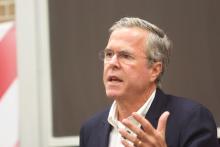
Fighting to allow people to live by their religious convictions, even if those convictions are unpopular or criticized, is a battle Jeb Bush believes the next president must lead.
The former Florida governor and GOP presidential candidate pledged to defend religious liberty in front of an estimated 13,000 evangelical pastors attending a massive Southern Baptist Convention event Aug. 4 at Bridgestone Arena in Nashville.

As Southern Baptists prepare to interview Republican presidential candidates Jeb Bush and Marco Rubio in Nashville, Tenn., on Aug. 4, a group of mostly younger pastors is challenging the methods used by the old religious right and urging a broader agenda and more qualified support for the Republican Party.
“There’s a whole generation of guys coming up saying we’re tired of being the lapdogs of the GOP and, worse than that, being tossed away like a Kleenex after the election is over,” said Ryan Abernathy, 40, teaching pastor at West Metro Community Church in Yukon, Okla.
“I know a ton of people saying we should no longer be blindly giving our allegiance to one political party.”

When it comes to political partisanship in the 2016 presidential race, it might be said that Southern Baptists have taken one step forward and two steps back.
The Ethics and Religious Liberty Commission, the public policy arm of the Southern Baptist Convention, announced in a press release that its president Russell Moore would be interviewing Republican candidates Jeb Bush (live) and Marco Rubio (via video) before 13,000 attendees at the denomination’s missions conference on August 4. Leading candidates from each major party were invited, the release states, but only Rubio and Bush accepted.

Beheadings, enslavement, kidnappings, and rape plague minority religious communities across the Middle East, and it’s time for President Obama to fill a job created to address their plight, a group of prominent evangelicals, scholars, and other religious leaders told the White House.
In the seven months since Congress created a “special envoy for religious minorities in the Middle East and South Central Asia,” the extreme violence against these groups has only escalated, the religious leaders wrote to Obama on April 20. Nominate someone, they implored.
“The persecution and even eradication of religious minorities in the Middle East right now is the biggest humanitarian and national security crisis that we face,” said Southern Baptist leader Russell Moore, who serves as president of the denomination’s Ethics & Religious Liberty Commission.
“There is a moral imperative to do everything we can to advocate for imperiled religious minorities.”
The letter, sent under the auspices of the Washington-based International Religious Freedom Roundtable, was signed by Moore and 22 other religious freedom activists, including National Association of Evangelicals President Leith Anderson and the Rev. Joel Hunter of Northland Church in Central Florida. More than 30 groups also signed, including Coptic Solidarity, the Chaldean Community Foundation, International Christian Concern, and the United Methodist Church’s General Board of Church and Society.
“The Islamic State’s murderous reach has extended beyond Iraq and Syria,” the letter reads, asking Obama to “swiftly” find a candidate for the envoy job.
“Doing so would signal to beleaguered communities in the Middle East, and beyond, that America stands with them.”

A new report by the Equal Justice Initiative documents in horrific detail the nation’s widespread practice of lynching and points to a link between lynching and a practice that persists today: capital punishment.
In the Jim Crow South, lynching declined as officials turned to executions as an alternative method for killing blacks in disproportionate numbers.
This report challenges us to confront our nation’s legacy of racial violence. Sadly, too many Christians were complicit in this violence, which has prompted Christian denominations to apologize and emphasize racial reconciliation. Last week, the Southern Baptist Convention held a two-day race summit in which it urged pastors to do more to diversify their churches.
These are important steps.
But they only mark time if important actions don’t follow.

How tough is it to create a racially diverse denomination? Consider a recent luncheon organized by the Southern Baptist Convention, the nation’s largest Protestant denomination.
About 100 Nashville-area evangelical leaders accepted invitations to a lunch hosted by the denomination’s policy arm, the Ethics & Religious Liberty Commission. On the agenda: a pitch for a spring summit and a short discussion by ERLC President Russell Moore about the need for churches to become more racially diverse.
The number of African-Americans who showed up for the lunch? Four (two of them denomination employees).
ERLC leaders originally planned a summit on bioethics. They quickly shifted gears after grand juries in November and December failed to indict police officers for the deaths of young unarmed black men. Moore’s social media remarks condemning the New York City jury’s decision not to indict the officer who killed Eric Garner were met with an angry backlash, some from people filling Southern Baptist pews and pulpits.
Black church leaders are greeting news of the summit with reactions ranging from polite skepticism to hopeful support.
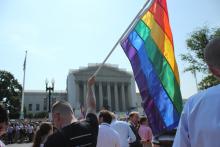
Ten years after Massachusetts became the first state to allow same-sex marriage, gay and lesbian Americans can be wed in 35 states and the District of Columbia (Florida will boost that number to 36, starting Jan. 6). This year, the Supreme Court may put an end to the skirmish by legalizing what progressives call “equality” and conservatives dub a “redefinition” of this cherished social institution.
The court last ruled on gay marriage in 2013 when the justices gutted much of the federal Defense of Marriage Act in United States v. Windsor and delivered a massive blow to anti-gay marriage advocates. Since then, the court has acted by not acting — in effect, doubling the number of states where gay marriage is legal, from 17 to 35, by refusing to hear a slew of appeals last year.
In November, the Cincinnati-based 6th U.S. Circuit Court of Appeals upheld gay marriage bans in four states, which will almost certainly require the high court to decide the issue once and for all.
Conservative Christians have been among the most ardent opponents of gay marriage and rights for decades. How will they respond if the Supreme Court makes gay marriage legal nationwide?
The answer, it turns out, depends on which Christian you’re speaking to.
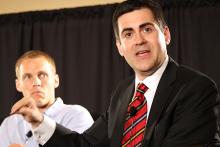
“African-American brothers and sisters, especially brothers, in this country are more likely to be arrested, more likely to be executed, more likely to be killed.”
It’s the kind of statement that’s often cited by black clergy and civil rights activists. But hours after a grand jury on Dec. 3 chose not to indict the New York City police officer who put Eric Garner into a fatal choke hold on Staten Island, those words came from none other than white evangelical leader Russell Moore.
With back-to-back grand jury decisions that white police officers will not face charges in the deaths of unarmed black men, white Christians, including evangelicals, have grown more vocal in urging predominantly white churches to no longer turn a blind eye to injustice and to bridge the country’s racial divides.
“It’s time for us in Christian churches to not just talk about the gospel but live out the gospel by tearing down these dividing walls not only by learning and listening to one another but also by standing up and speaking out for one another,” said Moore, president of the Southern Baptist Convention’s Ethics & Religious Liberty Commission.
Other white evangelicals issued similar pleas.

Some leaders use trending topics or hashtags to build momentum around a certain conversation. The idea is that by pointing followers to a catchy hashtag, activists can spark conversation and rally supporters around a cause. On Nov. 24, for example, Twitter lit up with the hashtag #PrayForFerguson after a grand jury decided not to indict a white police officer who fatally shot a black teenager.
One of the earlier noteworthy mobilizing campaigns included #KONY2012, a movement founded by a Christian, who launched a campaign to try to capture African Lord’s Resistance Army leader Joseph Kony. First Lady Michelle Obama famously participated in the #BringBackOurGirls campaign after more than 200 Nigerian schoolgirls were kidnapped by the terrorist group Boko Haram.
But everyone on Twitter is learning that a hashtag cuts both ways — it can be hijacked or lampooned by detractors, and it’s a key way that online activists are pushing back against opposing messages or what some might even call hate speech.
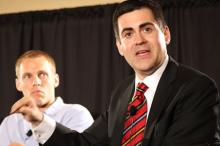
Prominent U.S. evangelicals Russell Moore and Rick Warren blasted the sexual revolution at a Vatican conference Nov. 18 and said it is destroying the institution of marriage.
Moore, the public face of the Southern Baptist Convention, said sexual liberation had created “a culture obsessed with sex” that had simply led to a “boredom of sex shorn of mystery.”
“Western culture now celebrates casual sexuality, cohabitation, no-fault divorce, family redefinition and abortion right as part of a sexual revolution that can tear down old patriarchal systems,” Moore told a global gathering of leaders from Catholic, Jewish, Muslim, and other faiths as part of the “Complementarity of Man and Woman” conference convened by Pope Francis.
The Southern Baptist ethicist said the sexual revolution appeared to have imposed a new patriarchy that enabled men to “pursue a Darwinian fantasy of the predatory alpha male” for the pursuit of “power, prestige, and personal pleasure.”
“Does anyone really believe these things will empower women and children?” he asked. “We see the wreckage of sexuality as self-expression all around us, and we will see more yet.”